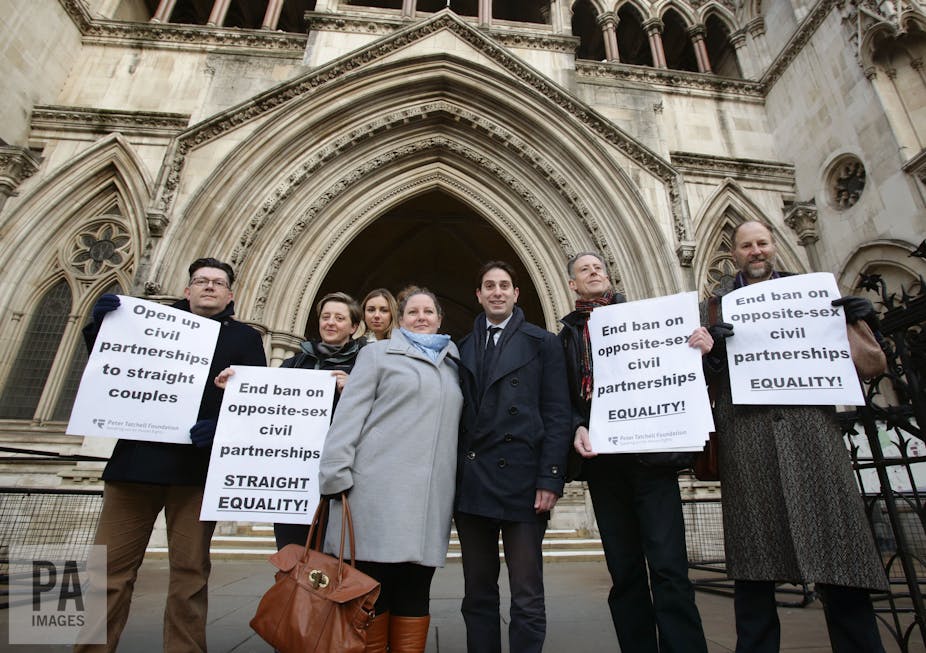A petition is currently circulating which urges the UK government to consider extending civil partnerships to all couples. Powering this campaign are Rebecca Steinfeld and Charles Keidan, who earlier this year lost a high court legal battle in which they framed their inability to form a civil partnership as an instance of discrimination on the grounds of sex. They point out that same-sex couples can marry or form a civil partnership, while different-sex couples may only formalise their relationship via marriage. Their case will appear before the Court of Appeal on November 2 and 3.
Marriages are as varied as the people who choose them, and the relationships they formalise can of course be egalitarian, respectful, and progressive. Yet the institution’s historical horrors are incontrovertible. Until 1991, a man could rape his wife within the law: marriage implied sexual consent. Traditionally, wives have been the legal property of their husbands, have had to rescind their legal property to their husbands, and have been expected to vow their obedience and servitude.
Even now, the legal articulation of marriage has some egregious quirks. The government still blithely describes “unconsummated” marriages as “defective”, and liable to be annulled, as though the partner was a returnable product. Consummation requires penetration of a vagina with an erect penis, resulting in “emission”. Politicians balked at defining an equivalent act for same-sex couples.
For some, the most troubling aspect of marriage is that it assigns names associated with gendered social roles to “husbands” and “wives”. Not everybody wants to append this oppressive history to their most cherished relationship, and not everybody wants to be referred to, or thought of, as a husband or a wife.
The law favours couples
Yet if the long history of marriage is a blight against it, then surely so too is the shorter history of civil partnership. It stood as a compromise while institutions and individuals resisted the extension of full marriage to same-sex couples, leading to a status that has been cringingly described as “separate but equal”. It’s hard to have too much sympathy for heterosexual couples bemoaning their inability to grab the grudging olive branch extended to one of society’s most historically marginalised populations.
Understandably, Steinfeld and Keidan want the same legal and financial privileges as married people. Yet surely a more worthy cause would be the right to practise whatever relationships a person wishes to have, without being legally and financially penalised because you are not married.
Pragmatic reasons for formalising relationships tend to centre on wanting to specify who can visit if a person is hospitalised, who would inherit under rules of intestacy, and acquiring various financial benefits. Contrary to popular belief, hospitals nowadays give you the right to nominate a next of kin, which is not a legal designation but an informal elective one. It could be your cohabiting long-term partner, your best friend, or a reliable neighbour. You can even carry a “next of kin” card that trumps any presumptions that medical staff might make.
Unfortunately, if a person dies intestate, their non-formalised partner is not automatically recognised. This is despite revisions to the law in 2014, including pressure from lawyers to recognise those co-habiting for five years as automatic inheritors. Clearly, the law needs to be challenged, but for now, a person who isn’t in a state-sanctioned relationship would do well to make a will, which at least permits them to make specific instructions about their final wishes.
As for the various tax and pension benefits available to those in formal unions: surely tax dues in life or death ought to relate only to how much money has been amassed, not relationship status? Married couples can save hundreds of pounds each year through the Married Couples Allowance compared with their unmarried peers, which might be seen as a tax on the unmarried. My own view is that if you’re in the prosperous minority who qualify to do so, you should pay up your inheritance tax dues just as an unmarried person must. Marriage should not bear on a person’s individual duty to contribute to a social good and we ought to challenge tax laws on this front.
None of the state’s business
We ought not to be encouraging the state to endorse new categories of legitimate relationships, thereby tacitly devaluing others. Instead, we should be scrutinising the state’s position that it is better or “more normal” to devote one’s love exclusively to one person, or that long-term relationships should be favoured over short-term ones. Not everybody can or should live that way. These choices fall outside the remit of the state, and ought not to affect one’s entitlements as a citizen.

Marriage is championed by the state because it was a historically expedient way of ensuring that for each man working outside the home, there would be a woman allocated to perform unpaid care work within the home under the private dominion of her husband. One could guarantee workers’ replenishment, and therefore their productivity, with nominal cost to the state in terms of care and discipline. Granting the right to sex within that unit assured the production of more workers. Marriage therefore served to make women’s work invisible and men’s work more profitable.
Things are no longer so gendered nor so bleak, but the incentives for dividing into nuclear, self-caring reproductive units remain. This state control of our intimacy and care ought to be resisted.
It makes me deeply suspicious that the state would reward me financially for permitting them to formalise just one of my personal relationships. I see the fact that the government offers benefits for particular relationships as a bribe to encourage the life choices that it endorses. There is a fight to be had, but it isn’t the one Steinfeld and Keidan are so studiously pursuing. Nobody should be getting perks or penalties for their intimate choices. If you’re so inclined, meeting a person to share your life with is reward enough.

